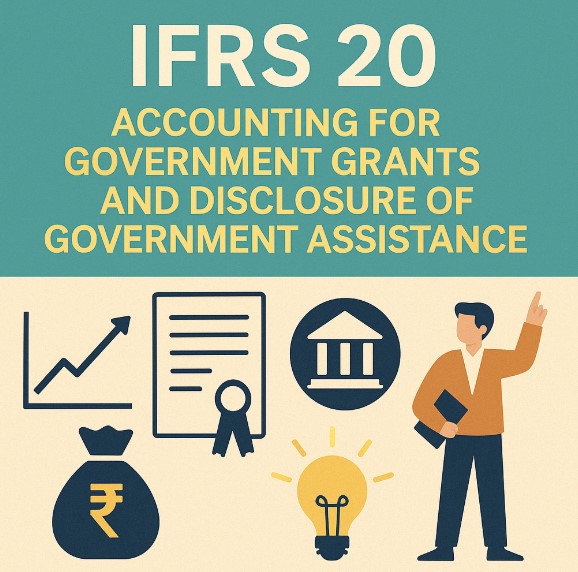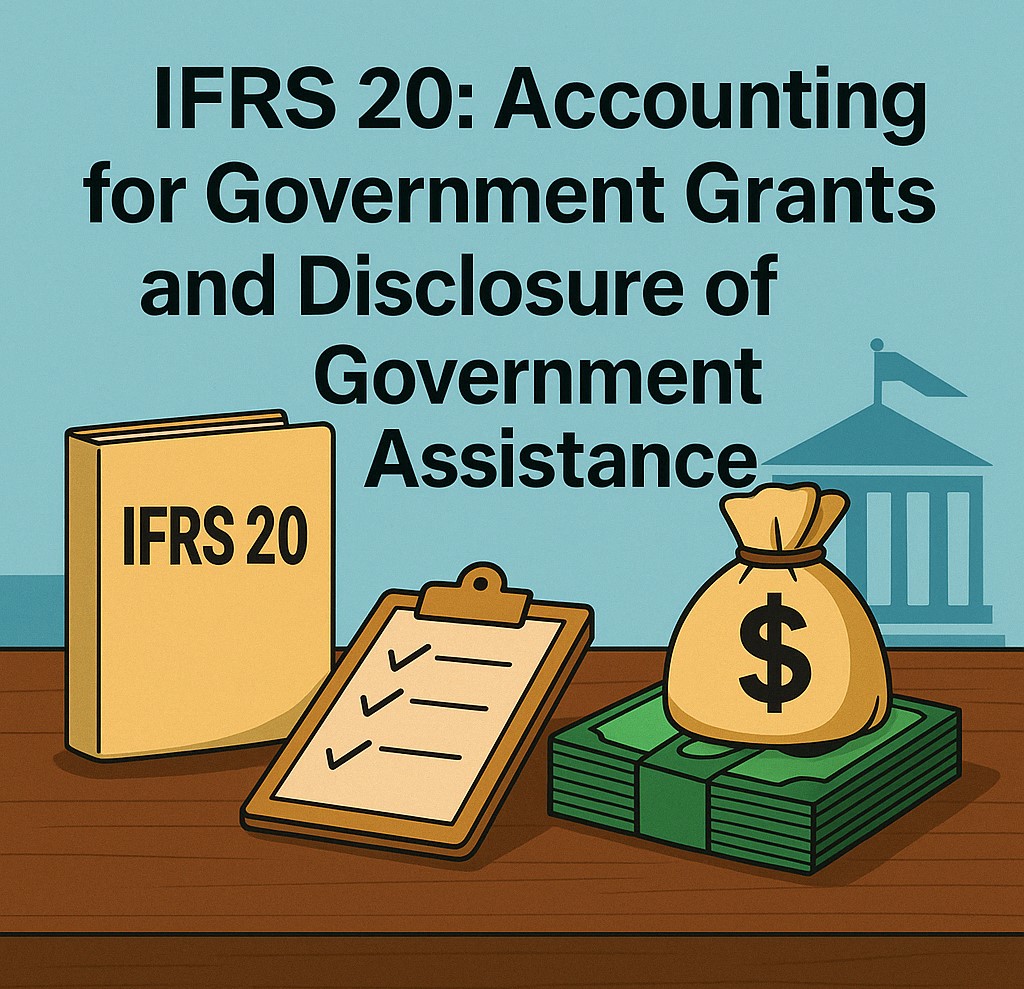
IFRS 20: Accounting for Government Grants and Disclosure of Government Assistance
Government grants are a common form of assistance provided by governments to businesses in various sectors. These grants may be provided to encourage investment, support operational activities, or achieve specific policy objectives. However, accounting for such grants requires clarity and consistency to ensure that financial statements reflect their true impact on an entity’s financial position. International Financial Reporting Standard (IFRS) 20, Accounting for Government Grants and Disclosure of Government Assistance, provides a comprehensive framework for recognizing, measuring, and disclosing government grants.
In this blog, we will explore the key provisions of IFRS 20, focusing on how businesses can accurately report government grants, the treatment of government assistance, and the necessary disclosures.
When it comes to government grants, compliance isn’t just about following the rules – it’s about ensuring that your financial position is accurately reflected. IFRS 20 offers the structure we need to manage these grants efficiently.
What is a Government Grant?
A government grant is an assistance provided by a government in the form of cash or other resources to an entity to support its activities or to incentivize specific achievements. Grants can vary widely, including financial support for operations, investments, or policy-driven incentives.
Examples of government grants include:
- Capital grants: Financial assistance for purchasing or constructing property, plant, and equipment (PPE).
- Revenue grants: Grants offered to offset operational expenses such as salaries, overheads, or utility costs.
- Tax-related grants: Tax credits or exemptions provided to encourage specific business activities or investments.
- Research and development grants: Government funding to promote innovation and development in key sectors.
Objective of IFRS 20
The primary objective of IFRS 20 is to provide guidance on how businesses should account for government grants and disclose government assistance. The aim is to ensure that entities consistently recognize and measure government grants in a way that is clear, transparent, and in line with global best practices. The standard also ensures that entities disclose relevant information, giving users of financial statements a complete picture of government support.
Recognition of Government Grants
According to IFRS 20, government grants should be recognized in the financial statements when there is reasonable assurance that:
- The entity will comply with the conditions attached to the grant.
- The grant will be received.
This ensures that grants are only recognized when there is sufficient evidence to conclude that the conditions have been met and that the entity is likely to receive the grant.
Types of Government Grants
IFRS 20 classifies government grants into three main categories, each of which has different recognition criteria and measurement methods:
- Grants Related to Income: These grants are typically provided to offset the cost of an entity’s operational activities. For instance, they may cover specific expenses such as research and development, training programs, or environmental initiatives. Grants related to income are recognized as income on a systematic basis over the periods in which the related expenses are incurred.
- Grants Related to Assets: Grants related to the acquisition, construction, or improvement of long-term assets such as property, plant, and equipment are recognized as deferred income. The income is then recognized systematically over the useful life of the related asset.
- Grants Related to Specific Government Policies: Governments often provide grants to encourage investment in specific sectors or regions, such as renewable energy, technology, or infrastructure. The treatment of these grants depends on the nature of the grant (whether it relates to income or assets) and the conditions attached.
Accounting Methods for Government Grants
Under IFRS 20, there are two approaches for recognizing government grants:
- Income Approach: Under this method, government grants related to income are recognized as income over the periods during which the related costs are incurred. This approach is used when the grant offsets specific operating costs such as employee wages or training expenses.
- Deferred Income Approach: Grants related to assets are initially recognized as deferred income in the balance sheet. The grant income is then recognized over the asset's useful life, typically by reducing the carrying amount of the asset or through a systematic amortization.

Measurement of Government Grants
The amount of a government grant should be measured at the fair value of the resources received or receivable. In certain cases, this may include adjusting the value of the grant for non-cash considerations or below-market interest rate loans.
Example: If a government provides a loan at a below-market interest rate, the difference between the market rate and the actual rate is considered a grant and should be recognized in the financial statements.
Repayable vs. Non-Repayable Grants
1. Non-repayable Grants: Non-repayable grants are the most common form of government assistance and do not require the entity to return the funds. These grants are typically recognized as either income or deferred income, depending on the nature of the related activity (revenue or capital).
2. Repayable Grants: If a government grant is repayable, it is treated as a liability until the repayment conditions are fulfilled. Repayable grants are recognized as liabilities, and any required repayments should be reflected in the financial statements.
3. Loans at Below-Market Interest Rates: When a government provides a loan at a rate lower than the market interest rate, the difference between the market rate and the actual rate is considered a grant. This difference should be recognized as income over the loan period.
Disclosures under IFRS 20
IFRS 20 requires businesses to disclose detailed information about government grants and assistance in their financial statements:
- Nature and Extent of Grants: Entities must disclose the nature of the grants received, including the conditions attached and the purpose of the grants.
- Accounting Policy: Companies must disclose their accounting policies related to the recognition, measurement, and presentation of government grants. This includes whether they use the income approach or the deferred income approach.
- Unfulfilled Conditions: Any unfulfilled conditions or obligations attached to the grants should be disclosed. This includes any potential repayments or contingent liabilities arising from the grants.
- Impact on Financial Statements: The effect of government grants on the company’s financial position, performance, and cash flows must be disclosed, including any grants used to fund specific activities or projects.
- Repayable Grants: If any grants are repayable, companies must provide details about the terms and conditions of repayment and the balance outstanding.
Example of Government Grant Accounting under IFRS
Consider a company that receives a grant of ₹50,00,000 for the purchase of machinery to enhance its production capabilities. The grant is provided under a government program designed to promote industrial growth.
- Recognition (Income Approach): The company could recognize the grant income over the life of the machinery, amortizing the grant amount annually based on the machinery’s depreciation schedule.
- Recognition (Deferred Income Approach): The company would initially recognize the grant as deferred income and reduce the carrying value of the machinery. The grant income would then be recognized over the life of the machinery, typically through a reduction in depreciation.
Conclusion
IFRS 20 provides clear guidance on accounting for government grants, ensuring transparency and consistency in financial reporting. By adhering to these standards, businesses can accurately report government assistance, enabling stakeholders to make informed decisions. Whether dealing with operational grants or those related to long-term assets, following IFRS 20 ensures that entities maintain clarity in their financial statements and comply with international accounting practices.
Is your business fully compliant with IFRS 20 when it comes to government assistance?
